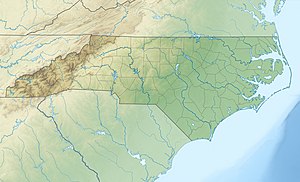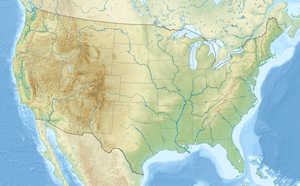Mill Creek is a 3.39 mi (5.46 km) long 2nd order tributary to Lanes Creek in Union County, North Carolina.
| Mill Creek Tributary to Lanes Creek | |
|---|---|
| Location | |
| Country | United States |
| State | North Carolina South Carolina |
| County | Union (NC) Chesterfield (SC) |
| Physical characteristics | |
| Source | Mangum Branch divide |
| • location | about 4 miles northeast of Dudley, South Carolina |
| • coordinates | 34°49′12″N 080°27′55″W / 34.82000°N 80.46528°W[1] |
| • elevation | 570 ft (170 m)[2] |
| Mouth | Lanes Creek |
• location | about 1 mile northeast of Beulah Church |
• coordinates | 34°50′43″N 080°25′44″W / 34.84528°N 80.42889°W[1] |
• elevation | 490 ft (150 m)[2] |
| Length | 3.39 mi (5.46 km)[3] |
| Basin size | 5.22 square miles (13.5 km2)[4] |
| Discharge | |
| • location | Lanes Creek |
| • average | 6.17 cu ft/s (0.175 m3/s) at mouth with Lanes Creek[4] |
| Basin features | |
| Progression | Lanes Creek → Rocky River → Pee Dee River → Winyah Bay → Atlantic Ocean |
| River system | Pee Dee River |
| Tributaries | |
| • left | Gibbs Branch |
| • right | unnamed tributaries |
| Bridges | Myers Lane, Robert Funderburk Road, Bud Pyler Road, Stack Road, Medlin Road, Landsford Road, US 601 |
Course
editMill Creek rises about 4 miles northeast of Dudley, South Carolina in Chesterfield County. Mill Creek then flows north into North Carolina to meet Lanes Creek about 1 mile northeast of Beulah Church.[2]
Watershed
editMill Creek drains 5.22 square miles (13.5 km2) of area, receives about 48.5 in/year of precipitation, has a topographic wetness index of 467.85 and is about 42% forested.[4]
References
edit- ^ a b "GNIS Detail - Mill Creek". geonames.usgs.gov. US Geological Survey. Retrieved 25 October 2020.
- ^ a b c "Cedar Branch Topo Map in Union". TopoZone. Locality, LLC. Retrieved 24 October 2020.
- ^ "ArcGIS Web Application". epa.maps.arcgis.com. US EPA. Retrieved 25 October 2020.
- ^ a b c "Mill Creek Watershed Report". US EPA Geoviewer. US EPA. Retrieved 25 October 2020.

